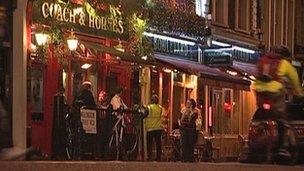Night parking to cost West End firms '£800m a year'
- Published

Owners of firms in the West End said it would lead to a "downward spiral" in business
Plans to introduce night-time parking charges in Westminster could cost businesses up to £800m a year and lead to 5,000 job losses, a report said.
The study commissioned by West Ending Campaign said if the charge is £4.80 an hour it could drive customers away.
Simon Thomas, leader of the campaign, said businesses could close if customers were "unable to park free".
Westminster Council said the study was "completely flawed" as it charges £2.40 an hour for most of the week.
'Downward spiral'
West Ending Campaign commissioned the research by the Centre for Economics and Business Research.
The study found there could be an £800m fall in customer demand in the West End a year for theatres, pubs, restaurants, casinos and hotels, leading to £714m lost profits per year.
At least 5,100 jobs could be at risk as businesses try to cut costs to recoup lost profits, it claimed.
A night-time and weekend parking charge could lead to an annual additional labour cost of £125m for businesses who could end up raising prices or force businesses to close, the report said.
Simon Thomas, who owns Leicester Square's Hippodrome Casino, said: "If doors start closing in the West End through lack of customers unable to park free at night then there will be less to attract people into the centre, then more places will close etc etc..... it's a downward spiral.
"It doesn't take a genius to work out that if you make it £25 more expensive to have a night out in one place, prospective customers might just choose somewhere else to go."
But Westminster Council highlighted that the impact on businesses was based on an assumed £4.80 an hour charge and the researchers also assumed that people visiting the West End would all come in their cars.
'Only assumption'
The report, however, states that for the purposes of the impact assessment, the assumption was made that 20-25% of the "night-time population" travels by car.
Councillor Lee Rowley, Westminster's cabinet member for parking and transport, said: "This research is completely flawed.
"The report admits within the first four pages that the figures are just plucked from thin air using the term 'rough and ready'.
"And in the conclusion it says the findings are based only on 'indicative analysis and assumption'."
He added the local authority was yet to conduct a detailed research on the impacts of the parking changes.
- Published11 October 2011
- Published2 August 2011
- Published20 July 2011
- Published16 May 2011